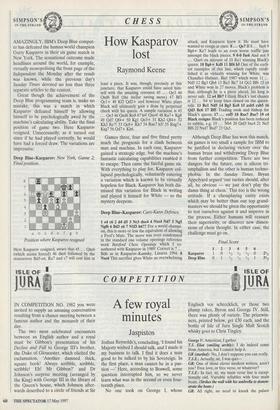SIMPSON'S
IN-THE-STRAND
SIMPSON'S
IN-THE-STRAND
CHESS
How Kasparov lost
Raymond Keene
AMAZINGLY, IBM's Deep Blue comput- er has defeated the human world champion Garry Kasparov in their six game match in New York. The sensational outcome made headlines around the world, for example, virtually monopolising the front page of the Independent the Monday after the result was known, while the previous day's Sunday Times devoted no less than three separate articles to the contest.
Great though the achievement of the Deep Blue programming team is, make no mistake, this was a match in which Kasparov defeated himself by allowing himself to be psychologically awed by the machine's calculating ability. Take the final position of game two. Here Kasparov resigned. Unnecessarily, as it turned out since if he had played correctly, he would have had a forced draw. The variations are impressive: Deep Blue–Kasparov: New York, Game 2; Final position.
Position where Kasparov resigned
Here Kasparov resigned, aware that 45 ... Qxc6 (which seems forced) 46 dxc6 followed by the manoeuvre Bd5-e6, Ra7 and c7 will cost him at least a piece. It was, though, precisely at this juncture, that Kasparov could have saved him- self with the amazing resource 45 ... Qe3 46 Qxd6 Re8 (the stellar saving move) 47 Bf3 Qcl+ 48 Kf2 Qd2+ and however White plays Black will ultimately gain a draw by perpetual check with his queen. A sample variation is 45 Qe3 46 Qxd6 Re8 47 h4! Qxe4! 48 Ra7+ Kg8 49 Qd7 Qf4+ 50 Kgl Qe3+ 51 Kh2 Qf4+ 52 Kh3 Re7! 53 Qc8+ Kh7 54 Rxe7 h5! 55 Rxg7+ Kxg7 56 Qd7+ Kh6.
Games three, four and five fitted pretty much the prognosis for a clash between man and machine. In each case, Kasparov gained a strategic edge, but the machine's fantastic calculating capabilities enabled it to escape. Then came the fateful game six. With everything to play for, Kasparov col- lapsed psychologically, voluntarily entering a variation which is known to be virtually hopeless for Black. Kasparov has both dis- missed this variation for Black in writing and played it himself for White — so the mystery deepens.
Deep Blue–Kasparov: Caro-Kann Defence.
1 e4 c6 2 d4 d5 3 Nc3 dxe4 4 Nxe4 Nd7 5 Ng5 Ngf6 6 Bd3 e6 7 N1f3 h6?? For a world champi- on, this is more or less the equivalent of allowing a Fool's Mate. The move was even condemned in the standard one volume openings reference work Batsford Chess Openings which I co- authored with Kasparov in 1989! Correct is 7 ... Bd6 as in Kasparov–Kamsky, Linares 1994. 8 Nxe6 This sacrifice gives White an overwhelming
attack, and Kasparov knew it. He must have wanted to resign at once. 8 Qe7 If 8 ... fxe6 9 Bg6+ Ke7 leads to an even worse traffic jam amongst the black pieces. 9 0-0 fxe6 And not 9 Qxe6 on account of 10 Rel winning Black's queen. 10 Bg6+ Kd8 11 Bf4 b5 One of the earli- est examples of this line, which rapidly estab- lished it as virtually winning for White, was Chandler–Hubner, Biel 1987 which went 11 ... Nd5 12 Bg3 Qb4 13 Rel Bel 14 Qe2 Bf6 15 c4 and White won in 27 moves. Black's problem is that, although he is a piece ahead, his king is never safe. 12 a4 Bb7 I think Black's last chance is 12 ... b4 to keep lines closed on the queen- side. 13 Rel Nd5 14 Bg3 Kc8 15 axb5 cxb5 16 Qd3 Bc6 17 Bf5 Trading rook and bishop for Black's queen. 17 ... exf5 18 Rxe7 Bxe7 19 c4 Black resigns Black's position has been reduced to rubble, e.g. 19 ... Nb4 20 Qxf5 bxc4 21 Ne5 Bf6 22 Nxd7 Bxd7 23 Qa5.
Although Deep Blue has won this match, six games is too small a sample for IBM to be justified in declaring victory over the human brain and withdrawing Deep Blue from further competition. There are two dangers for the future, one is silicon tri- umphalism and the other is human techno- phobia. In the Sunday Times, Bryan Appelyard argued 'our tactics should, after all, be obvious — we just don't play the damn thing at chess.' This too is the wrong attitude. If a chessplaying entity exists which may be better than our top grand- masters we should be given the opportunity to test ourselves against it and improve in the process. Either humans will reassert their superiority, or discover new dimen- sions of chess thought. In either case, the challenge must go on.
Final Score
1 2 3 4 5 6
Kasparov 1 0
1/2 1/2 1/2
0
21/2
Deep Blue 0 1
1/2 1/2 1/2
1
31/2


































































 Previous page
Previous page